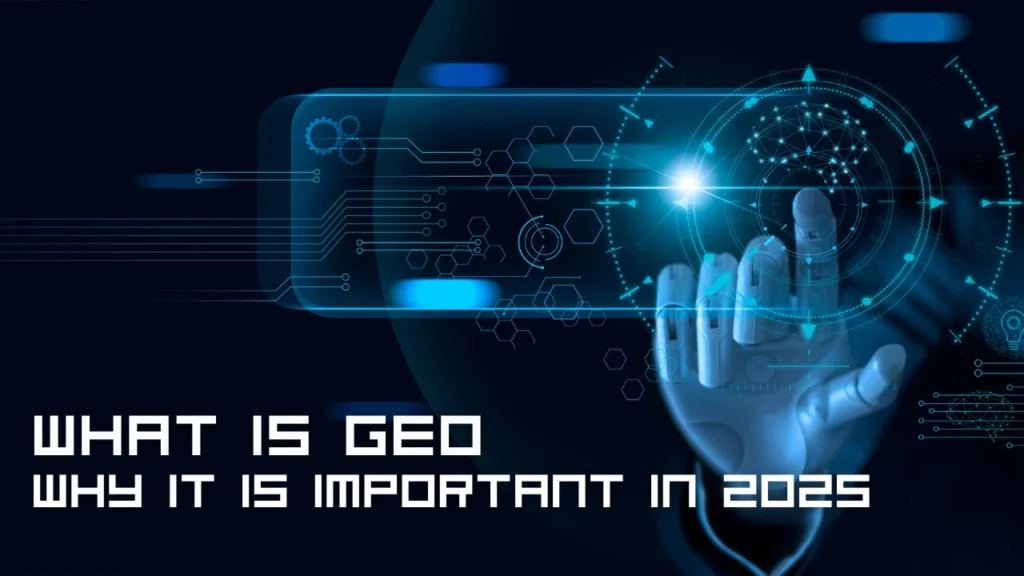What is GEO and why it is important in 2025
August 2, 2025
Seo Services

Did you know that right now 60% of Google searches end without anyone ever clicking a link? User habits are changing—fast. With more people turning to AI tools like ChatGPT, Perplexity, and Google’s new AI Overviews, the way we think about online visibility needs a major update. Traditional SEO (Search Engine Optimization) alone isn’t enough. Enter: GEO.
Table of Contents
What is GEO?
GEO stands for Generative Engine Optimization. It’s SEO’s next evolution—an approach for the AI era. While SEO helps your content get ranked in search engine results, GEO helps your content get quoted, referenced, and used directly by AI platforms when they answer user questions.
Think of GEO as making your website not just findable, but “AI-friendly.” The goal isn’t just to be on page one of Google, but to get your content recognized and cited by AI that powers modern search experiences.
Why Is GEO Important in 2025?
AI now helps answer millions of queries, often without users clicking on any traditional website links. If your content isn’t optimized for AI, you risk missing out on a growing audience that gets their answers straight from these AI systems—not your webpages.
AI searches are “zero-click.” Users ask questions and get instant answers from the AI based on the best available sources. If your content is GEO-optimized, AI will pull from it, allowing you to reach new audiences—even if they never see your site directly.
How Is GEO Different From SEO?
While SEO and GEO share some principles, they serve different masters:
| SEO (Search Engine Optimization) | GEO (Generative Engine Optimization) | |
|---|---|---|
| Focus | Rankings in traditional search pages | Being referenced in AI answers |
| Audience | People clicking on blue links | AI systems (ChatGPT, Perplexity, Gemini, etc.) |
| Metric of Success | Traffic to your website | Citations by AI, inclusion in direct answers |
| Content Style | Keyword-focused, web-structured | Clear, factual, quotable, context-rich |
Similarities Between SEO and GEO
- Both focus on creating high-quality, relevant, and trustworthy content.
- Both rely on understanding user intent—what people are really asking for.
- Both need your site to be crawlable and information to be clearly organized.
- Even AI tools often pull from top-ranked websites on Google, Bing, and other search engines, so the foundation of good information matters.
Key Steps to GEO-Optimize Your Content
- Write for AI Understanding: Use clear language and structure. Summarize key points up front and use headings, bullet lists, and direct answers.
- Cite Facts and Be Original: AI prefers data that’s easy to validate and content that stands out from generic web copy.
- Keep Information Up-to-Date: AI models love current, accurate data—refresh your pages regularly.
- Be Direct and Factual: Structure answers so an AI can easily “quote” your sentence when answering a question.
- Schema Markup and Structured Data: Use schema to help AI interpret your content correctly.
Why You Still Need SEO
You can’t abandon SEO; it’s still essential for brand trust and traffic from traditional search results. GEO simply builds on that base, preparing your content to be discovered by new “readers”: AI engines delivering answers to millions.
Conclusion
GEO will help your business grow in the age of AI-first search. If you want your content to remain visible as user habits shift, you need to optimize for both human eyes and AI minds. Combine traditional SEO best practices with GEO strategies, and your content will be ready for whatever the future of search brings.
Get more customers with the best SEO services in Prayagraj—boost your traffic, grow your business, and shine online today.
FAQs
1. What is GEO and how is it different from SEO?
GEO, or Generative Engine Optimization, is an approach focused on making your content easily accessible, understandable, and quotable by AI-powered search engines (such as ChatGPT, Perplexity, and Google’s AI Overviews). While SEO aims to rank your website on traditional search results, GEO ensures your content is referenced or cited directly in AI-generated answers. The key difference: SEO targets human users to drive website clicks, whereas GEO targets AI systems to secure citations and visibility in AI-generated responses.
2. Why does GEO matter in 2025?
In 2025, a significant portion of user queries—up to 60%—end without a traditional click, often because AI tools answer questions instantly. If your content isn’t GEO-optimized, you risk missing the growing audience that relies on AI for direct answers, reducing your website’s reach and influence.
3. What are the main steps to GEO-optimize my content?
- Write in clear, AI-friendly language using direct answers, bullet points, and headings.
- Present original, well-cited facts to make your content easy for AI to validate and quote.
- Keep your content current and regularly updated.
- Use structured data and schema markup so AI can accurately interpret your information.
4. Can SEO and GEO work together?
Yes, GEO doesn’t replace SEO. Instead, it complements it. SEO is still essential for attracting human visitors and maintaining brand trust, while GEO expands your reach by ensuring your content is visible to AIs that deliver answers directly to users.
5. How will GEO impact my business's online visibility?
By making your content “AI-friendly,” GEO increases the chances of your site being referenced in AI-generated answers, even if users never land directly on your website. This extends your reach to audiences using AI for instant answers, helping to grow your influence and customer base in the evolving digital landscape.
About the Author
Satyam Gupta
Hi, I'm an SEO specialist with expertise in driving organic traffic, optimizing websites, and enhancing online visibility through tailored strategies, keyword research, and content optimization techniques.
